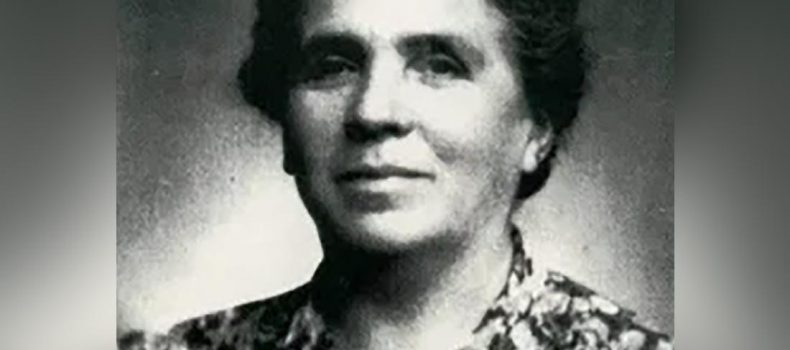“Khavele iz fun der arbet gegangen” performed by Lifshe Schaechter-Widman
Khavele iz fun der arbet gegangen is a folklorized version of the labor/worker‘s song Brider, mir hobn geshlosn by Khaim Alexandrov (1869 – 1909). Molly and Bob Freedman‘s on-line catalogue lists two recorded versions of this song; one can be found on the LP Yiddish Songs of Work and Struggle produced by the Jewish Students Bund (1970s) and on the two cassette field recording of the singer Sarah Benjamin that Dr. Sheldon Benjamin produced in 1984 (cassette two). This week I offer a third version, a field recording by Lifshe Schaechter-Widman, recorded by Leybl Kahn in New York in 1954.
Information on this song can be found in Joseph and Chana Mlotek‘s book Perl fun der yidisher poezye pp. 515-517. The original title, as it was published in the newspaper Arbeter [published in Vilna?] Oct. 8th, 1904, was Khaverim in kamf and consists of versions of the three verses that LSW sings. Sarah Benjamin prefaces her performance by saying that it was a Zionist song.
Clearly LSW‘s recollection that she heard this when she was 5 or 6 years old (she was born in 1893) does not jibe with the information we have on the song. However her memory that it had to do with a strike in Galicia does match up with the folklorist Shmuel-Zanvil Pipe‘s comment which we find in Pipe‘s letter (from Vilna) to his folklorist/mentor I. L. Cahan in NY, Dec. 1936. The version Pipe collected begins with „Khanele iz fun der arbet gegangen‟ and has 5 verses.
Pipe writes – „This song was created in Drohobych (Yiddish- Drubitsh, then Galicia, today Western Ukraine) during the bloody elections for the Austrian parliament, March 30th, 1911. Fayershtein, a leading figure in Drohobitsh, was campaigning for Levenshteyn to be elected. The authorities intentionally provided only a narrow voting space, and only 60 people received permission to vote. The place became packed and tense and an order was given to fire a salvo – 26 died and 55 were wounded. „ Pipe further writes that he is doubtful that the song is a folksong, and thinks it probably „has a father‟. Cahan, Shtudyes vegn yidisher folksshafung, YIVO, 1953 pp. 345-346.
So I surmise from this that a Galician/Bukovina variant developed from Alexandrov‘s earlier version, beginning with the line „Khanele/Khavele iz fun der arbet…‟ Sarah Benjamin‘s Litvish version is predictably closer related to the older version.
In lectures, I sometimes play LSW‘s performance of this song and contrast it with the LP version sung by the Youth Bund chorus. The chorus sings it with a marching rhythm, and I am sure that‘s it how it is sung, perhaps even today, at Jewish socialist gatherings. When LSW sings the same song, only a hint of the march remains, and she interprets the song more in the style of an old ballad, with an emotional build-up leading up to the last two lines.
Introduction spoken by Lifshe Schaechter-Widman (LSW);
interviewer Leyb Kahn (LK).
LSW: S’iz geven in Galitsye vi s’iz du naft
This happened in Galitsye, where there was oil.
LK: In voser shtot iz dos geven?
In what town did this happen?
LSW: Mistame Yaruslav, lebn Pshemesh.
Iz gegangen a meydl, imshildik, un zi iz geteyt gevorn. S’iz du a lid fin ir.
Probably Yaruslav, near Pshemesh, and she was killed. There’s a song about her.
LK: Ven hot ir dus gehert?
When did you hear this?
LSW: Ikh bin geveyn a kind, efsher 5 yor, si’z geven mit 50, 55 yur fleg me dus zingen.
I was a child, maybe 5 years old; this was 50, 55 years ago when it was sung.
Khavele iz fin der arbayt gegangen.
Zi hot dokh fun gurnisht gevisht.
Iz aroys a falsh komande
Un m’hot af Khavelen geshist.
Khavele went to work.
She was totally unaware.
A false command was given,
And they shot at Khavele.
Khavele iz geleygn a toyte,
di eygelekh tsigemakht.
M’hot zi tsigedekt mit der fun, der royter,
A korbn funem strayk hot zi gebrakht.
Khavele is lying dead,
her eyes closed.
She was covered with the red flag:
She became a victim of the strike.
Az se treft dikh a koyl mayn getraye,
Fin dem soyne, dem hint,
Dan trug ikh dikh af mayne hent fun dem fayer.
Un ikh heyl dir mit kish dayne vind.
If you are hit by a bullet, my dear one,
by the enemy, that dog.
Then I will carry you on my arms away from the fire,
and heal with my kisses your wounds.
חווהלע איז פֿון דער אַרבעט געגאַנגען,
זי האָט פֿון גאָרנישט געוווּסט.
איז אַרויס אַ פֿאַלש קאָמאַנדע,
און מ’האָט אויף חווהלען געשיסט
חווהלע איז געלעגן אַ טויטע,
די אייגעלעך צוגעמאַכט.
מ’האָט זי צוגעדעקט מיט דער פֿאָן דער רויטער;
אַ קרבן פֿונעם סטרײַק האָט זי געבראַכט
אַז סע טרעפֿט דיר אַ קויל, מײַן געטרײַע,
פֿון דעם שׂונה, דעם הונט,
דאַן טראָג איך דיך אויף מײַנע הענט פֿונעם פֿײַער,
און הייל דיר מיט קיש דײַנע וווּנד

